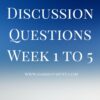Description
HLT 306 Week 4 Quiz
- What is the healthcare professional legally responsible to do in patient education?
- What percentage of patients has been found to be noncompliant with health recommendations?
- What are the goals of patient education?
- What is the healthcare professional’s role in teaching the patient at different life stages?
- Which of the following is an example of patient compliance?
- Which of the following would be considered life-stages?
- Why was there more concern with preventative health care starting in the fifties?
- Which of the following has been found to be one of the most important factors in patient compliance?
- Which of the following is one form of nonverbal behavior?
- Why is the need for patient education expanding?
- Which of the following are the three categories of learning?
- Examples of patient noncompliance include:
- What is acculturation?
- What is multicultural patient education?
- Which of the following are considered relationship skills?
QUIZ 2 Week 5
- What is the purpose of informed consent?
- CAM is:
- What should the patient’s condition be to give informed consent?
- Which of the following ethical theories means “do no harm”?
- What is the goal of patient education of the elderly?
- Which of the following is a barrier to education of the elderly?
- When a patient receives a terminal diagnosis what are some of the stages he will experience?
- What are values?
- Teaching aids should be used
- What is “ageism” in healthcare?
- The definition of negotiation as it applies to patient education is:
- What is the one thing terminal patients find most difficult?
- How is it possible to integrate CAM and conventional medicine?
- Illiteracy is:
- Activity/passivity is usually used in patient education under such circumstances as





